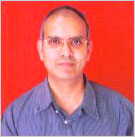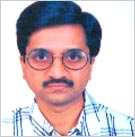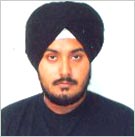First, their simplicity: You think you are going to meet entrepreneurs who have built a world class product in India and expect them to be nattily dressed, polished in their manners and a bit arrogant. When you meet them you are surprised to find them dressed in sandals and sneakers that mismatch their clothes, manners that are down to earth and a modesty shaped by their background.
Now their brilliance and gumption: All three had cosy jobs in one of the world's most respected software companies with jobs that earned them a bomb. But the emotion of "building a world-class Indian product by Indians" and the entrepreneurial bug bit them and they decided to call it a day.
"We essentially wanted to build a huge organisation from scratch and my ambition was to get cutting-edge technology to India," says one of the three partners of Druvaa, a start-up that says it has built a world class data backup software product that will cost companies one-sixth the price quoted by the number one company in the data protection domain.
Ramani Kothandaram, Milind Borate and Jaspreet Singh, three former Veritas employees, have built a product that will help big companies protect their crucial data from corruption resulting out of any emergency. "If you compare our product with the best in the domain then more than 80 per cent of their features are identical," they say, confident of adding that remaining 20 per cent in about another six months.
"If Indians can build great products for foreign companies in India then why can't an Indian build as great a product in India for an Indian company?" reasons Milind who has four patents in the storage domain space in his name and awaiting 11 more patents in the same field.
While Milind has done his MTech in computer science from IIT Bombay, Jaspreet is a computer science grad from IIT, Guwahati. Interestingly, Ramani has no background of computer science for he is a BTech from the Agriculture Engineering College, Jabalpur. He later did his Master's from the Cranfield University, UK on an ODA scholarship
Rediff.com's Prasanna D Zore spoke to Druvaa's Ramani Kothandaram and Milind Borate about their cutting-edge product, how they managed to do it and the challenges this 'Made in India by an Indian for an Indian company' product will face. Jaspreet was in New Delhi on business when this interview was conducted.
How do you explain your product to a layperson?
Ramani: We have two products: Druvaa Replicator and Druvaa In Sync.
 Let us say that you have a computer. If your computer crashes then you take a back up of the data on that machine so that you don't lose important data. When we do this time is not so important. But when the servers of large banks and BPOs crash they can't lose business by closing their servers. Also, how fast and till what point-in-time can you restore and recover data on your original servers is also very important.
Let us say that you have a computer. If your computer crashes then you take a back up of the data on that machine so that you don't lose important data. When we do this time is not so important. But when the servers of large banks and BPOs crash they can't lose business by closing their servers. Also, how fast and till what point-in-time can you restore and recover data on your original servers is also very important.
Thus, data replicators like Druvaa's helps an organisation continue its business even if there is a disruption or breakdown of their main servers for whatever reasons. For instance, Druvaa's Replicator and In Sync can help computers in ten different locations mirror or replicate their data in case of any disaster on a single computer anywhere in the world.
About your start up days and challenges
 Milind: The start-up days were the most exciting days. We had a new idea, we were excited about it and we wanted to do something pathbreaking. Those were the days when we did not have any feedback so we thought everything that we did was right.
Milind: The start-up days were the most exciting days. We had a new idea, we were excited about it and we wanted to do something pathbreaking. Those were the days when we did not have any feedback so we thought everything that we did was right.
As we moved along we built the first version, went to customers and tried to get their feedback on our product. It is then we started to realise the market realities. Then came the phase when we started to question ourselves -- if we had the right dreams or not. But the intensity kind of always grew.
When we started going to customers and as they started liking our product it gave a tremendous boost to our confidence. We realised that we had a very good product and people wanted to buy it. However, we couldn't market our product aggressively. Those were the challenging days for us.
As we started convincing our investors about our product and got more investments we again started believing in ourselves.
How did you three come together?
Ramani: We are all ex-Veritas employees. Milind had left Veritas before I joined but still we came to know about each other. In fact Veritas still has a lot of file systems and lot of products whose development and architecture was done by Milind. He was a technical director at Veritas. Milind had authored a book Windows Undocumented. In a way Milind is a who's who in the storage domain. So it was easy to find and know about Milind.
 Jaspreet is our young entrepreneur. We found that Veritas had a product called Veritas Volume Replicator and there were some challenges for people to use this product. It had some performance and deployment issues. You needed a Veritas engineer to deploy the product. Jaspreet and Milind came up with this whacky idea of developing a similar product that will be easy to use and deploy.
Jaspreet is our young entrepreneur. We found that Veritas had a product called Veritas Volume Replicator and there were some challenges for people to use this product. It had some performance and deployment issues. You needed a Veritas engineer to deploy the product. Jaspreet and Milind came up with this whacky idea of developing a similar product that will be easy to use and deploy.
Jaspreet, who is a born entrepreneur, was studying in Germany. I pulled him in because he too is as ambitious as we are and that's how we all came together.
Milind: For the last 15 years I have been developing software for American companies out of which I worked for Veritas for seven years. I thought it was about time I start doing it for an Indian company. I met Ramani who had similar ambitions. We essentially wanted to build a huge organisation from scratch and my ambition was to get cutting-edge technology to India. That's how we came together.
How long will it take for Druvaa to bring the cutting-edge technology to India? How soon will you be able to convince the advantages of your product to Indian users?
Milind: We are not in a one or zero kind of a situation. We are trying to build it in parts. We are not saying we will build the whole product first and then try to sell it. What we have built till now is a plain replicator in which data from here goes to the other site. What we want to do next is essentially continuous data protection.
So instead of having one copy of your data and the replication site we want to have point-in-time copies so that businesses can go on about their work seamlessly even if there is data corruption or damage due to any emergency.
Suppose there is a virus attack on your primary data centre at 12 o'clock. And you knew about it only after four hours. However, you want all the data as it existed at 12 o'clock because after that it got corrupted and you want point-in-time copies of that data. That's the next thing that we want to do and we are sure we will do it in the next six months.
How much money was brought in to build this product?
Ramani: Initially we funded the project with our own funds and help from friends and relatives. (According to Rehan Yar Khan of the Indian Angel Network the IAN has invested Rs 1 crore (Rs 10 million) in Druvaa). While we never had any estimation of how much money will be required to build this product we have spent only Rs 35 lakhs (Rs 3.5 million) till now. We spent another Rs 20 lakhs (Rs 2 million) for establishing the company and getting hardware to test the product.
What's your role in Druvaa?
Ramani: While Milind is the chief architect and decides on the direction that the product should take I decide on how the company should grow, which direction the company should take, the overall strategic decision-making.
Jaspreet is helping us in the business development area; all through he has been the product manager. He is the interface between Milind and me.
What was your initial reaction when you realised you have developed a world class product?
Ramani: I was thrilled because for me developing an end-to-end product from scratch in India and taking on the global bigwigs is what I had always dreamt of. The moment I realised that we have this first product in hand we took it to St Gobain and deployed it there. It worked successfully in the test environment.
It was a day when it rained heavily in July 2007 but I still came to the Siddhi Vinayak temple (the famous Ganesha shrine in Mumbai) to offer my thanks to God.
Your early lives...
Ramani: I come from a very middle class family. My father was in defence accounts and so we moved across Indian cities after every one, two years. Before joining college I had traveled across eight Indian states. Later I did my BTech in Agriculture Engineering from Jabalpur; then I did my Master's from Cranfield University, UK. I got an ODA scholarship to do my Master's.
When I came back to India I was a scientist in the Department of Space and a senior officer in the Cabinet Secretariat. Then I worked with TCS as a group manager. Later I left India and went to Australia and worked with IBM Australia for 5, 6 years. Then I came back to India and joined Veritas as managing partner, operations.
Milind: I was born and brought up in Pune. I did my early schooling in a Marathi medium school. I did my Bachelor's from The Pune Institute of Computer Technology in 1993. Then I joined IIT Bombay to do my MTech after three years. That's where the transition happened. I came across students from across India who could not speak Hindi or Marathi.
In Pune it was not necessary to speak English. The first two months when I started to learn the Queen's language were a bit difficult. I passed out in 1998 and joined Veritas where I worked for about seven years. After that I started a services company Coriolis Technologies.
My grandfather was a farmer and my father studied till Class X in his village. My father then came to Pune and struggled a lot to continue with his education there. I have imbibed my father's spirit to struggle and do something that was not previously done.
My mother has been running a school for the past 30 years that caters to the lower income group (he consciously avoids using "sophisticated and snobbish" sounding words like 'underprivileged') who do not have enough money to go to a good school. I have got the patience and tenacity of my mother. It was my father's spirit to struggle and succeed that I have inculcated since childhood.
What sparked your motivation to start on your own?
Ramani: I wanted to take on the best in the world.
If you see even today there is no Indian software product that sells across the world very well. There are some products like Ramco's ERP product, some financial products developed by Infosys and TCS. But there is no product like the ones developed by Microsoft, Oracle or SAP. Though most of these products are today owned by American companies they were developed by a majority of Indians working for these American companies.
Even in Symantec and Veritas the products with cutting-edge technology have been developed by Indians. This made me think that if Indians can build great products for foreign companies in India then why can't an Indian build as great a product in India for an Indian company?
How promising is your product?
This is a very interesting question to answer. When we developed this product we were very confident of hitting the one-million dollar mark pretty soon. But that's how all the start-up owners think. But when reality hits its different.
Although we have not yet made our first sale we are expecting to sell it to an Indian BPO company in Pune soon. Though it's not a very large BPO we think that it is a good entry for Druvaa in the BPO space. We would like to address a lot of other verticals but the BPO industry will do to begin with.
How can you sell your product at one-sixth the cost of that of your competitor?
Ramani: It is like this. People use any software product not because it is ideal for them but because everybody else is using it.
For instance if I tell you that there is something better than Microsoft Word then you may not be interested because a) you are so familiar with Word that you may not find it useful to learn how to use a new product and b) if you send that file across then the person at the other end should also have the same software installed to run it.
So people use particular software for a lack of choice. When we developed our product keeping in mind the actual user requirement in India we realised that it doesn't need all the sophisticated features that users hardly use. For they not only make the product complicated but also increase the cost for the user.
The size of our entire software is only about 10 MB. It's so well-engineered that we can even e-mail across it to our clients.
Also to deploy any replication software you need a skilled engineer who works on a time-bound pay to deploy that software. Our replicator software can be installed and deployed in an hour's time. The main purpose of our product is to replicate data in case of a crisis.
Our product is user-driven and feature-specific. Also maintenance of our product is very simple. Addressing these issues has helped us develop a low cost software product that can give a tough time to our competitors.
Do you think you have a world-class product and it is only a matter of time before it is accepted across the world?
Milind: If you compare our product with the best in the domain then more than 80 per cent of their features are identical. At the same time our product has advantages in performance, usability and simplicity. But our product doesn't have other complicated features like n is to n replication (this technology facilitates n number of computers under threat replicate data to n number of computers located anywhere in the world; in simple words this technology is a scale up of Druvaa's one is to one replicator).
However, that is in our roadmap and once we include this feature into our product I think we will be the best.
It is only a matter of resources. We shall be able to achieve n is to n replication in another six months and then you could call our product the world's best. We are four of us working on this feature now and we plan to hire four more engineers to develop the n is to n replicator product. You don't need a huge team to build a world-class product; only a few technology geniuses can do it.
How soon will you ship your product to foreign companies?
Ramani: Sukanto Ganguly from the US, who is on our board of directors, will help us take our product to the US market soon. Also, my boss at IBM Australia, Sharon Dempsey, has started her own company Certainty Soft. She plans to sell Druvaa products in the Australian market. So things, as we see, look bright to us at Druvaa.





